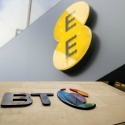Eurobites: BT-EE Deal Clears Another Hurdle
Also in today's EMEA regional roundup: Ericsson completes Envivio acquisition; Numericable-SFR sees revenues slip in Q3; Deutsche Telekom and Huawei get friendly on IoT, cloud.

Also in today's EMEA regional roundup: Ericsson completes Envivio acquisition; Numericable-SFR sees revenues slip in Q3; Deutsche Telekom and Huawei get friendly on IoT, cloud.
BT Group plc (NYSE: BT; London: BTA) and EE have received provisional approval of their proposed merger from the Competition and Markets Authority. In its statement, the CMA said: "As BT is a smaller operator in mobile, it is unlikely that the merger will have a significant effect on competition. By the same token, it is unlikely that the merger will have a significant effect on competition in the retail broadband market, where EE is only a minor player." The final report will be published on January 18 and anyone wanting to respond to the provisional findings has until November 19 to do so -- one suspects BT and EE's rivals will be scribbling furiously even as you read this. (See BT, EE Defend $19.9B Merger Plans, BT Locks Down £12.5B EE Takeover Deal and BT Offers $19.5B to Buy EE.)
Ericsson AB (Nasdaq: ERIC) has completed its acquisition of Envivio Inc. (NASDAQ: ENVI), the video compression specialist, for $125 million. Envivio, based in San Francisco, has around 180 staff and claims about 300 customers globally. (See Ericsson Beefs Up TV Biz With Envivio Buy, AT&T Deal.)
French operator Numericable-SFR saw third-quarter sales fall 3.5% year-on-year to €2.77 billion ($3.06 billion), though EBITDA (earnings before interest, tax, depreciation and amortization) rose 15% to €1.03 billion ($1.14 billion), reports Reuters. The operator has been spending more on marketing in a bid to stem customer losses in what is an intensively competitive domestic market.
Telenor Group (Nasdaq: TELN)'s decision to divest all its shares in Russia's VimpelCom Ltd. (NYSE: VIP) dented its third-quarter figures, with the associated impairment charge of 5.4 billion Norwegian kroner ($634 million) pushing Telenor to a loss of NOK1.77 billion ($208 million) after tax. Revenues were actually up year-on-year, from NOK27.68 billion ($3.25 billion) a year ago, to NOK 31.83 billion ($3.74) this time round. Telenor has adjusted its guidance for the full year, to organic revenue growth of around 5% and an EBITDA margin of 34%-35%, largely as a result of the planned merger of its Danish operation with Telia Company 's equivalent unit failing to fly. (See For Sale: Telenor's $2.4B Stake in VimpelCom.)
The UAE's Etisalat , one of the Middle East's biggest operators, has blamed rising expenses and a fall in revenues outside its domestic market for an 8.6% year-on-year decline in net profit, to 1.95 billion Emirati dirhams ($530 million), in its third quarter, according to a report from Reuters. Although domestic revenues grew by 6%, to AED7.2 billion ($1.96 billion), those generated in other countries fell by 9%, to AED5.7 billion ($1.55 billion). The total number of customers served by Etisalat shrank by 6%, to 170 million, between September 2014 and September 2015.
Ooredoo Kuwait, the Kuwaiti mobile arm of the Qatari telecom incumbent, was reported to have seen a 69% year-on-year increase in third-quarter net profit, to about 13.3 million Kuwaiti dinars ($43.9 million), bringing to an end a long sequence of earnings declines. The operator's third-quarter revenues grew by just 1.5%, to 188.8 million ($623.8 million), which suggests that profits were boosted by cost-cutting activities. Ooredoo competes against incumbent Zain Group and Saudi Telecom Co. (STC) -owned Viva in the Kuwaiti mobile market.
Deutsche Telekom AG (NYSE: DT) and Huawei Technologies Co. Ltd. are getting it on. For starters, the pair have conducted what they claim is the first ever trial of Narrow Band IoT (NB-IoT) technology on a commercial network. NB-IoT, says the German giant, allows for network deployment with only 20KHz spectrum and a 20dB coverage gain compared with existing cellular-based offerings. For the main course, the pair have signed a cooperation agreement that will see them collaborate on the delivery of computing services from the public cloud, a platform they are calling the Open Telekom Cloud. Huawei will contribute the hardware and associated technology, while T-Systems International GmbH will deal with the customer interface end of things. (See DT Takes Cloud Fight to Google, Amazon.)
— Paul Rainford, Assistant Editor, Europe, Light Reading
Read more about:
EuropeAbout the Author(s)
You May Also Like




_International_Software_Products.jpeg?width=300&auto=webp&quality=80&disable=upscale)







